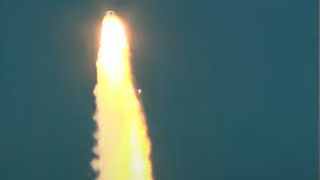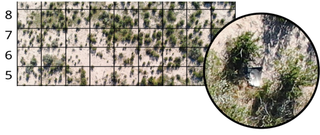
Blue Origin has figured out what doomed its most recent spaceflight.
That uncrewed mission — known as NS-23, because it was the 23rd flight of Blue Origin's New Shepard suborbital vehicle — lifted off from the company's West Texas launch site on Sept. 12, 2022, carrying 36 scientific payloads skyward.
Something went wrong about 65 seconds into the flight, however, resulting in the loss of New Shepard's reusable first-stage booster. The vehicle's capsule managed to launch itself away from trouble and landed safely under parachutes. Nobody was hurt, and no buildings or other property were damaged.
After a six-month investigation, Blue Origin has pinpointed the cause of the anomaly. The nozzle on the booster's single BE-3PM engine suffered "structural fatigue failure," which caused a thrust misalignment that triggered the capsule's emergency escape system, the company announced on Friday (March 24).
Related: Failure of Blue Origin's New Shepard a reminder that spaceflight is still hard

"The structural fatigue was caused by operational temperatures that exceeded the expected and analyzed values of the nozzle material," Blue Origin wrote in an update on Friday.
"Testing of the BE-3PM engine began immediately following the mishap and established that the flight configuration of the nozzle operated at hotter temperatures than previous design configurations," the company added.
Get the Space.com Newsletter
Breaking space news, the latest updates on rocket launches, skywatching events and more!
Blue Origin is taking action to prevent the problem from happening again. For example, the company is changing the design of the engine's combustion chamber and adjusting some of its operating parameters.
These steps "have reduced engine nozzle bulk and hot-streak temperatures," Friday's update states. "Additional design changes to the nozzle have improved structural performance under thermal and dynamic loads."
Blue Origin plans to fly again soon, according to the update. The return-to-flight mission will loft the science payloads from NS-23, which survived the anomaly and landed softly in the New Shepard capsule.
The New Shepard capsule's emergency escape system worked as designed during the anomaly, according to the investigation, which Blue Origin conducted with oversight from the U.S. Federal Aviation Administration and input from representatives of the National Transportation Safety Board and NASA's Flight Opportunities Program and Commercial Crew Office.
Six of the 23 New Shepard missions to date have been crewed, with the most recent passenger flight occurring in August 2022. People aboard the vehicle experience a few minutes of weightlessness and see the curve of Earth against the blackness of space, though their overall experience is brief; New Shepard missions last just 10 to 12 minutes from liftoff to capsule touchdown.
Blue Origin has used different New Shepard vehicles for its uncrewed and space-tourist flights. All six of the latter have flown on a craft called RSS First Step; the September 2022 research mission employed the New Shepard RSS H.G. Wells.
The NS-23 failure was the second in-flight anomaly for New Shepard. The only other one occurred on the vehicle's uncrewed debut mission back in 2015, when the booster crash-landed but the capsule made it to and from suborbital space successfully.
Mike Wall is the author of "Out There" (Grand Central Publishing, 2018; illustrated by Karl Tate), a book about the search for alien life. Follow him on Twitter @michaeldwall. Follow us on Twitter @Spacedotcom or Facebook.
Join our Space Forums to keep talking space on the latest missions, night sky and more! And if you have a news tip, correction or comment, let us know at: community@space.com.

Michael Wall is a Senior Space Writer with Space.com and joined the team in 2010. He primarily covers exoplanets, spaceflight and military space, but has been known to dabble in the space art beat. His book about the search for alien life, "Out There," was published on Nov. 13, 2018. Before becoming a science writer, Michael worked as a herpetologist and wildlife biologist. He has a Ph.D. in evolutionary biology from the University of Sydney, Australia, a bachelor's degree from the University of Arizona, and a graduate certificate in science writing from the University of California, Santa Cruz. To find out what his latest project is, you can follow Michael on Twitter.
